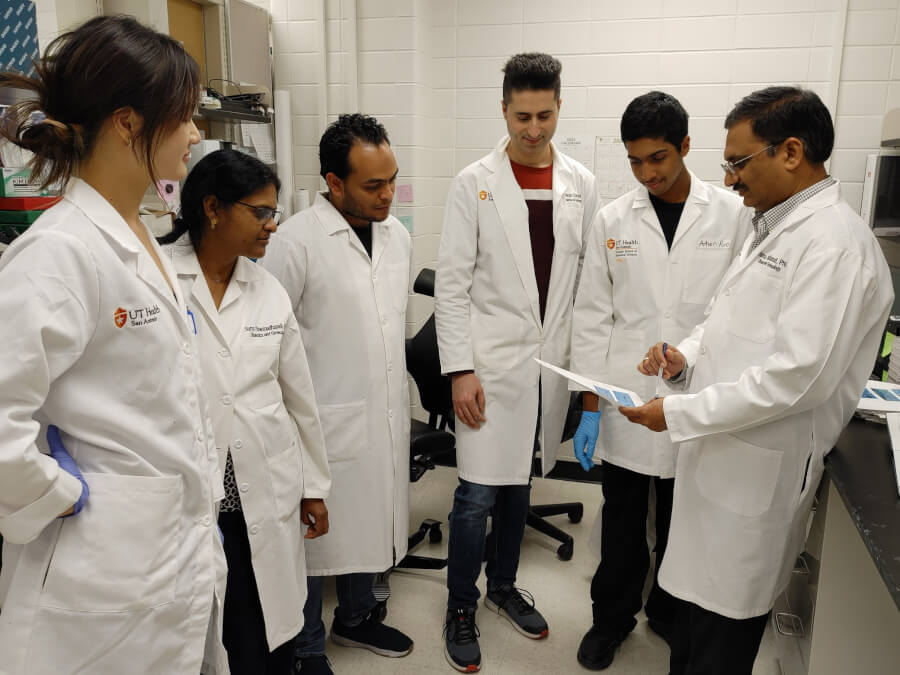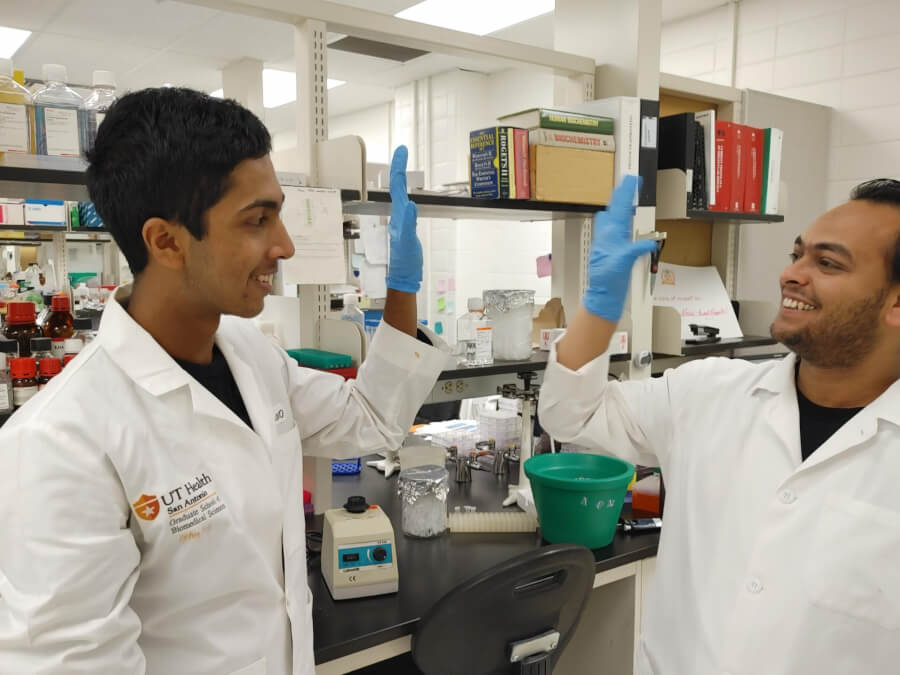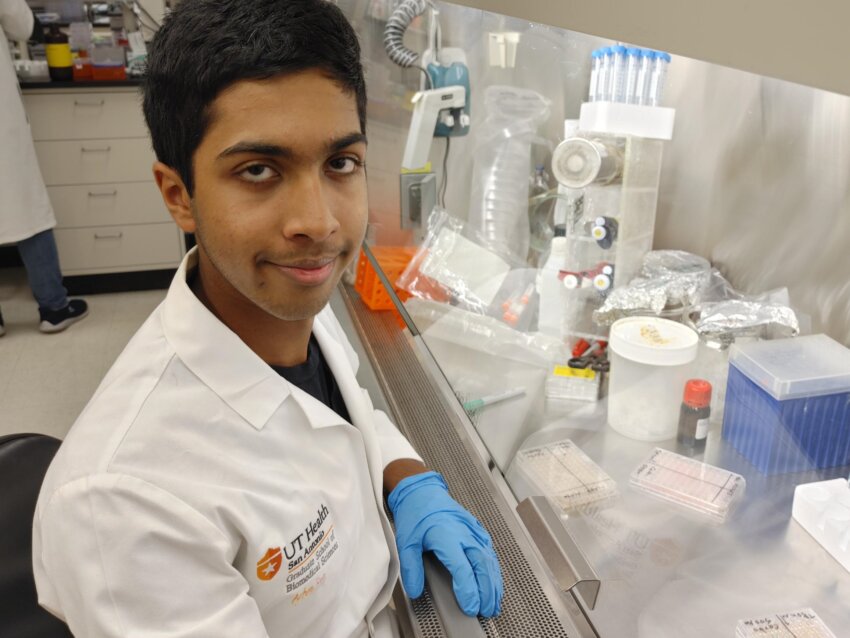For teenager Arhan Rao, repurposing an antidepressant drug to treat cancer is the opening act in a career of serving patients by finding new ways to stop tumors.
Contact: Will Sansom, 210-567-2579, sansom@uthscsa.edu
SAN ANTONIO (Oct. 28, 2022) — As Arhan Rao, 17, watched his grandfather sicken with cancer and die three years ago, a goal formed in the youngster’s mind. He would become an oncology physician and researcher, discover a new generation of cancer treatments, and bring them to patients. During summer internships at The University of Texas Health Science Center at San Antonio, Rao learned fundamentals of laboratory research.
Now his budding plan is off to a great start.
Clinical trials based on Rao’s lab observations about an existing drug are underway in breast and brain cancer at the Mays Cancer Center, the National Cancer Institute-Designated Cancer Center located at UT Health San Antonio. Imipramine, a drug long approved by the U.S. Food and Drug Administration (FDA) to treat depression, is slowing tumor growth in the human breast cancer study at the Mays Cancer Center. The other trial, in glioblastoma, is in its early stages.
Rao is second author on a paper published earlier this year in Cancer Letters, a peer-reviewed journal. In mouse and human tumor cells, imipramine inhibited triple-negative and estrogen receptor-positive breast cancers. These tumor types are notoriously difficult to treat in people.
Old medicines for new indications
“While researching initiatives from the National Cancer Institute, I found that the NCI has given priority to repurposing FDA-approved drugs as cancer treatments,” Rao said. “This attracted my attention. These drugs will be safe, as they are used to treat other diseases. If the same drugs work to kill cancer cells, then they can be used in clinics right away.”
Rao discussed the idea with his faculty mentor, Ratna Vadlamudi, PhD, professor of obstetrics and gynecology and co-leader of the Cancer Development and Progression Program at the Mays Cancer Center. The Vadlamudi lab hosted Rao the past several summers, including with precautions during the pandemic. Rao is a senior this fall at Health Careers High School in the Northside Independent School District.
“Dr. Vadlamudi mentioned that an FDA-approved drug library exists and that I could test those drugs in an unbiased way to find out if they work,” Rao said. “I began screening candidate drugs and discovered that imipramine was able to stop the growth of cancer cells.”

Drug is already given to some cancer patients
“When human patients receive chemotherapy and other treatments, they may develop depression,” Vadlamudi said. “Imipramine is one of the antidepressants prescribed for them, and the NCI library indicated that it might have anticancer activity. Arhan was curious to delve into this. We trained him on technology to study our laboratory’s mouse models of breast cancer and actual human tumor specimens.”
Rao’s explorations provided evidence that imipramine has potent anti-cancer activity. By reducing estrogen signaling, imipramine stunts the growth of estrogen receptor-positive breast cancers, he found. The drug also interferes with DNA repair, which curbs the ability of triple-negative breast cancers to proliferate, the lab discovered. (DNA, or deoxyribonucleic acid, is a molecule that contains the genetic instructions we need for our bodies to operate. Because DNA is constantly under attack from factors such as radiation from the sun, DNA repair is extremely important for all cells, including cancerous cells.)
Window of opportunity to show effect in patients
The breast cancer clinical trial is directed by Virginia Kaklamani, MD, leader of the Breast Cancer Program at the Mays Cancer Center and professor of medicine/hematology-oncology at UT Health San Antonio. The team gave imipramine to women who had been newly diagnosed with breast cancer and awaited surgery.
“We typically have a window of two to three weeks or so between the diagnosis and the surgery, and this is an opportunity for us to give patients a drug and test to see how it does on the cancer tissue,” Kaklamani said.
The care team obtains a biopsy as part of the initial diagnosis and another tissue specimen during surgery. “This affords two time points so we can see how the cancer has changed with the imipramine treatment without having to subject women to more biopsies,” Kaklamani said. “We did that in 15 patients, and overall, we were able to show that imipramine can decrease the tumor growth.”
This small pilot study, funded by the Mays Cancer Center, is a preliminary experiment to show that imipramine is an active drug in breast cancer, Kaklamani said.
The heart of a champion, the will to succeed
Equipped with drive and a sense of purpose that is uncommon among teens, Rao is deeply interested in improving the lives of patients.

“Arhan is very mature, and mature with focus,” Vadlamudi said. “He knows what he wants to do already. He wants to go to medical school; he is interested in helping patients. Usually when students come to the lab, they learn some techniques and they go. But he is always thinking, how do I translate these findings?”
Rao went to four science fairs and won several awards in all of them. “He is very good at communicating science to people,” Vadlamudi said.
The young man is also extremely hard-working. Rather than summer breaks from school, Rao passionately pursued his science, learning his craft. In addition to summer breaks, he continued his research endeavors by working during weekends and the holiday breaks.
Rao is easy to work with, as well. “Sometimes young people in the lab are intimidated, but Arhan freely talks with our postdoctoral fellows and PhD students,” Vadlamudi said. “This shows that he has solid basic knowledge.”
‘We have a moral obligation to help others’
The National Cancer Institute understands the power of repurposing drugs. Cancer drug development can take 30 years and millions of dollars to get to the stage of human testing. “But if we already have a drug in use for a disease and we can find the right indications for its use in cancer, it’s a win-win situation,” Vadlamudi said.
“I believe as a society we have a moral obligation to help others,” Rao said. “Many cancer patients relapse after a couple of years, and that is so incredibly sad. We need to decrease that. We need to help researchers and society in general develop additional safe and effective treatment options. This project with imipramine is a part of that.
“If we save even one life from cancer, that is so incredibly important,” he said. “It is effective in that person’s quality of life going forward and his or her contribution to the community and society as a whole. That’s basically my philosophy.”
The world will look for great things from this Texas teenager who is already an accomplished biomedical research scientist at UT Health San Antonio.
The antidepressant imipramine inhibits breast cancer growth by targeting estrogen receptor signaling and DNA repair events
Santosh Timilsina, Subapriya Rajamanickam, Arhan Rao, Panneerdoss Subbarayalu, Saif Nirzhor, Nourhan Abdelfattah, Suryavathi Viswanadhapalli, Yidong Chen, Ismail Jatoi, Andrew Brenner, Manjeet K. Rao, Ratna Vadlamudi, Virginia Kaklamani (Note: Timilsina and Rajamanickam are co-lead authors.)
First published: May 12, 2022, Cancer Letters
https://www.sciencedirect.com/science/article/pii/S0304383522002014
The Mays Cancer Center at UT Health San Antonio is one of only four National Cancer Institute-designated Cancer Centers in Texas. The Mays Cancer Center provides leading-edge cancer care, propels innovative cancer research, and educates the next generation of leaders to end cancer in South Texas. Visit https://cancer.uthscsa.edu/.
The University of Texas Health Science Center at San Antonio (UT Health San Antonio) is a primary driver for San Antonio’s $42.4 billion health care and biosciences sector, the city’s largest economic generator. As the largest research university in South Texas, with an annual research portfolio of approximately $350 million, UT Health San Antonio drives substantial economic impact through its five professional schools, a diverse workforce of 7,200, an annual operating budget of more than $1 billion and a clinical practice that provides more than 2 million patient visits each year. Furthermore, UT Health San Antonio plans to add more than 1,500 higher-wage jobs over the next five years to serve San Antonio, Bexar County and South Texas. To learn about the many ways “We make lives better®,” visit www.uthscsa.edu.
Stay connected with The University of Texas Health Science Center at San Antonio on Facebook, Twitter, LinkedIn, Instagram and YouTube.


